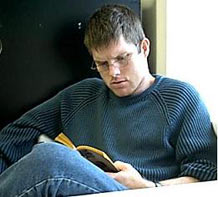 Sunday, September 16, 2007
Sunday, September 16, 2007
composing No Way.
I recently finished my first instrumental work since Hurricane Katrina passed through these parts. It is a short solo work for clarinet titled, No Way.
The initial seed of No Way was planted into my brain earlier this year when Al Theisen and I were talking about writing a new work based off of one of our older pieces where each bar of the new work was a variation off of that bar in the previous piece. Something about that idea just stuck with me. A couple of months later I heard a performance by the USM clarinet professor Gregory Oakes, at the Integrales New Music Festival in March, of a work by Ken Ueno titled, I screamed at the sea until nodes swelled up, then my voice became the resonant noise of the sea for amplified clarinet. That’s when I really started to churn around ideas for a clarinet piece.
Around June, I decided that the bar by bar variation idea using one of my old works could be successful for clarinet. The work I chose was for saxophone, and it was the first work I composed for that instrument. I have a little bit of a soft spot for that piece for that reason. The work was a serialist piece titled, Improvisation, which really wasn’t very improvisatory, but that was the name I branded it with. It has now seen a second life (a successful life, I hope) as a work for solo clarinet.
Since completing No Way, I have had a whirlwind of new ideas, and now I am working on a piece for pierrot ensemble plus percussion titled, Ice Nine. We will see how that goes. It has been fun so far.
posted by Everette Minchew
5:13 PM
|
|
 Composer Everette Minchew (born 1977) is consistently active in the creation, performance, and promotion of contemporary music. Moderately prolific, his catalogue includes small chamber pieces for violin, piano, various wind instruments, harpsichord and electronic music. Current commissions include a string trio and an opera based on an 11th-century crusades tale.
His earliest musical training came at the age of eleven when he began playing alto saxophone; it wasn?t long until he began his first attempts in composition.
Composer Everette Minchew (born 1977) is consistently active in the creation, performance, and promotion of contemporary music. Moderately prolific, his catalogue includes small chamber pieces for violin, piano, various wind instruments, harpsichord and electronic music. Current commissions include a string trio and an opera based on an 11th-century crusades tale.
His earliest musical training came at the age of eleven when he began playing alto saxophone; it wasn?t long until he began his first attempts in composition.
He received a Bachelor?s Degree in Music History from the University of Southern Mississippi, where he studied saxophone under world-renowned soloist, Lawrence Gwozdz.
Fearing that traditional university training would hinder his development as a progressive composer, he abandoned the idea of formal lessons in favor of an intense private study of modern masterworks.
Minchew's works are characterized by their intense timbral explorations and brutal dissonance. That is not to say, however, that the compositions are devoid of beauty. In the first of the Two Brief Pieces, for example, the harpsichord chimes stringent yet haunting chords evoking a sense of loss.
Other pieces, like the Figment No. 2 "Juggler's Fancy" play upon the kaleidoscopic interaction between timbres and tones. The rapid alternation of pizzicato, arco bowing, and extreme glissandi remind the listener of Xenakis coupled with a Berio Sequenza. Minchew's Invention "Two-Part Contraption" for piano owes much to Ligeti's etudes and boogie-woogie jazz.
His music has been performed around the United States, and he was the featured composer at the 2005 Intégrales New Music Festival in Hattiesburg, Mississippi.
He currently resides in Hattiesburg, Mississippi with his wife, Cheryl.
CONTACT INFORMATION
| |



